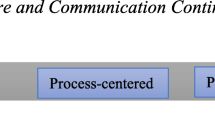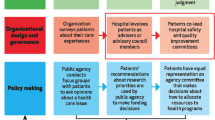Abstract
Introduction
While distress is prevalent among individuals living with cancer, distress management has not been optimized across cancer care delivery despite standards for screening. This manuscript describes the development of an enhanced Distress Thermometer (eDT) and shares the process for deploying the (eDT) across a cancer institute by highlighting improvements at the provider, system, and clinic levels.
Methods
Focus groups and surveys were used at the provider-level to outline the problem space and to identify solutions to improve distress screening and management. Through stakeholder engagement, an eDT was developed and rolled out across the cancer institute. Technical EHR infrastructure changes were implemented at the system-level to improve the use of the distress screening findings and generate automated referrals for specialty services. Clinic workflows were adapted to improve screening and distress management using the eDT.
Results
Stakeholder focus group participants (n=17) and survey respondents (n=13) found the eDT to be feasible and acceptable for distress identification and management. System-level technical EHR changes resulted in high accuracy with patient identification for distress management, and 100% of patients with moderate to severe distress were connected directly to an appropriate specialty provider. Clinic-level workflow changes to expand eDT use improved compliance rates with distress screening from 85% to 96% over a 1-year period.
Conclusions
An eDT that provides more context to patient-reported problems improved identification of referral pathways for patients experiencing moderate to high distress during cancer treatment. Combining process improvement interventions across multiple levels in the cancer care delivery system enhanced the success of this project. These processes and tools could support improved distress screening and management across cancer care delivery settings.


Similar content being viewed by others
Notes
WVU IRB Protocol review #2208628134
References
American College of Surgeons, Commission on Cancer (2012) Cancer program standards 2012: ensuring patient-centered care. American College of Surgeons. https://www.facs.org/media/t5spw4jo/2016-coc-standards-manual_interactive-pdf.pdf
Carlson LE, Zelinski EL, Toivonen KI et al (2019) Prevalence of psychosocial distress in cancer patients across 55 North American cancer centers. J Psychosoc Oncol 37:5–21
Funk R, Cisneros C, Williams RC, Kendall J, Hamann HA (2016) What happens after distress screening? Patterns of supportive care service utilization among oncology patients identified through a systematic screening protocol. Support Care Cancer 24:2861–2868
Knies AK, Jutagir DR, Ercolano E, Pasacreta N, Lazenby M, McCorkle R (2019) Barriers and facilitators to implementing the commission on cancer's distress screening program standard. Palliat Support Care 17:253–261
Swisher AK, Kennedy-Rea S, Starkey A et al (2020) Bridging the gap: identifying and meeting the needs of lung cancer survivors. J Public Health 1-6
Ercolano E, Hoffman E, Tan H, Pasacreta N, Lazenby M, McCorkle R (2018) Managing psychosocial distress: lessons learned in optimizing screening program implementation. Oncology (Williston Park) 32(488-490):492–483
Clover KA, Mitchell AJ, Britton B, Carter G (2015) Why do oncology outpatients who report emotional distress decline help? Psychooncology. 24:812–818
VanHoose L, Black LL, Doty K et al (2015) An analysis of the distress thermometer problem list and distress in patients with cancer. Support Care Cancer 23:1225–1232
Donovan KA, Handzo G, Corbett C, Vanderlan J, Brewer BW, Ahmed K (2022) NCCN distress thermometer problem list update. J Natl Compr Cancer Netw 20:96–98
Stout NL, Sleight A, Pfeiffer D, Galantino ML, deSouza B (2019) Promoting assessment and management of function through navigation: opportunities to bridge oncology and rehabilitation systems of care. Support Care Cancer 27:4497–4505
Author information
Authors and Affiliations
Contributions
All authors participated in concept development and data collection. NS, PP, and AD analyzed data. NS wrote the main manuscript and prepared all figures and tables. All authors reviewed and approved the final manuscript
Corresponding author
Ethics declarations
Ethics approval
In accordance with research ethical standards, this study was reviewed by the West Virginia Institutional Review Board and approved as an exempt protocol: Protocol # 2208628134.
Consent to participate
All focus group participants consented to participate in this quality improvement project.
Competing interests
NS reports speaker honoraria from MedBridge Inc., Survivorship Solutions LLC, and GreatSeminars and Books. CS, PP, JS, and AD have no disclosures.
Additional information
Publisher’s note
Springer Nature remains neutral with regard to jurisdictional claims in published maps and institutional affiliations.
Rights and permissions
Springer Nature or its licensor (e.g. a society or other partner) holds exclusive rights to this article under a publishing agreement with the author(s) or other rightsholder(s); author self-archiving of the accepted manuscript version of this article is solely governed by the terms of such publishing agreement and applicable law.
About this article
Cite this article
Stout, N.L., Street, C., Policicchio, P. et al. Implementing process improvements to enhance distress screening and management. Support Care Cancer 31, 351 (2023). https://doi.org/10.1007/s00520-023-07821-4
Received:
Accepted:
Published:
DOI: https://doi.org/10.1007/s00520-023-07821-4




